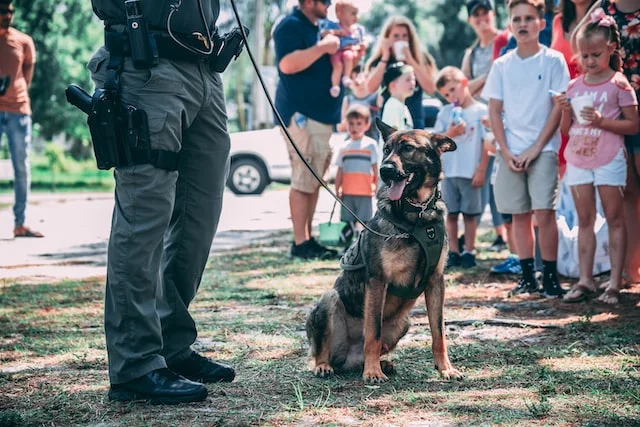Dogs don’t wear uniforms, dogs don’t hold a stick, and dogs don’t salute, and yet, dogs can do an equally beautiful job as human beings do in the police department, for which they do deserve a pay.
That brings us to the question for which we arrived at this article. Do police dogs get paid? And if they do, what do they get paid?
One will definitely not imagine an officer handing some money or a paycheck to these poor creatures who would simply be happy with a bone, and so we shall, in this article, explore more about this and how police dogs get paid.
Do police dogs get paid?

Yes, police dogs do get paid but not with a traditional paycheck as ordinary police officers do. Police dogs, on the other hand, get paid by way of all their immediate expenses being taken care of, like food, clothing, and shelter, while the paycheck mainly goes to the canine police officer entrusted to their care.
The officer, in turn, uses it to get his training, diet expenses, and medicines covered, to keep him healthy and fit for the role always.
How do police dogs get paid?
The following are some of the ways in which a police dog gets paid:
- Playtime: A good canine police officer is one who knows how to differentiate between work and play, ensuring that the dog is rewarded with ample time apart from work to play.
- Tasty Treats: Every dog owner knows that dogs love treats, and this is true in the case of a canine police officer who rewards his dog with treats too.
- Love and Affection: And finally, all this is not going to have the right effect without the one thing that every dog seeks from his owner, love, and affection, and so a canine police officer gives this in abundance too.
Being a police dog is hard, even with all the fun it gives to the dog. And a good canine police officer recognizes this to reward him in all the above ways.
Must Read: Are Police Dogs Neutered?
What about retired police dogs?
Retired police dogs do get paid, but again not with a fat pension that humans get when they walk away.
Retired police dogs are usually sent to retirement homes or other animal non-profit groups, where they are given the right amount of love and care, which makes up for their pay.
Some of them are made to live with families, and most of them continue to live with their handlers, who treat them with the appropriate amount of love and care.
Who pays for the expenses of a police dog?

The police agency most often pays for the expenses of the police dog, as this is where the dog is put to use.
However, there are times when the money can also come from the public and from corporate donations, which gets used to cover the expenses for the training of the dog.
This money can often come in the form of funds raised by organizations and groups that believe in the service of training police dogs for a cause.
How much do police dogs cost to acquire and train?
The cost to train a police dog could range anywhere from $8000 to $12000. However, in certain cases, this can even go up to $15,000, depending on the kind of role a dog is expected to play.
This is because a police dog is required to be obedient and agile as he will in his entire tenure be performing a myriad of tasks that would be impossible without these qualities.
Being a K9 officer is no easy task. There are unconventional schedules and places where one has to go, and it is for this reason that officers in this specialized unit are well rewarded and make about $30 per hour.
Are police dogs considered employees or equipment?
Police dogs are living beings and are hence considered employees, and a good police force is one that will recognize this and act accordingly. In other words, a police dog is as good as an officer in the police force and is to be treated as such.
True, they may not be able to read, write or drive, but one can’t deny the fact that they make up for a lot of things that a human police officer can’t do.
For these reasons, police dogs are meant to be valued and not merely treated as equipment to be used within the police force.
An officer in charge of a police dog thus goes through all the right training by way of animal handling, safety measures, communication, and physical fitness, all of which ensure their dog’s welfare in the police department down the years.
Recommended Reading: Why are my dogs balls black? 8 Reasons You Need to Know!
How much do k9 officers get paid?
An entry-level K9 officer generally gets a basic salary of about $40,000, which can only go on to increase with time and the passing of years as he trains his dog further, making him a greater asset in the police force.
This can go on to reach a figure of about $70,000, which an average K9 officer often makes in his experienced years.
That said, one can easily conclude that the paycheck of a K9 officer is a fairly handsome one, reasonably rewarding him for his efforts on the dog he provides the police force.
Final Thoughts on Do Police Dogs Get Paid?
So, the next time you see a police dog, you don’t have to worry as you know that he is most likely to be paid and treated well with all the right rewards and reinforcements in return for executive his responsibilities.
For yes, at the end of the day, sniffing up bombs and explosives is no joke, and one wouldn’t want to ignore the efforts of a dog towards this and his services towards the police force.
So again, if you ask us, “are police dogs paid” we will say, “yes, they are”!

